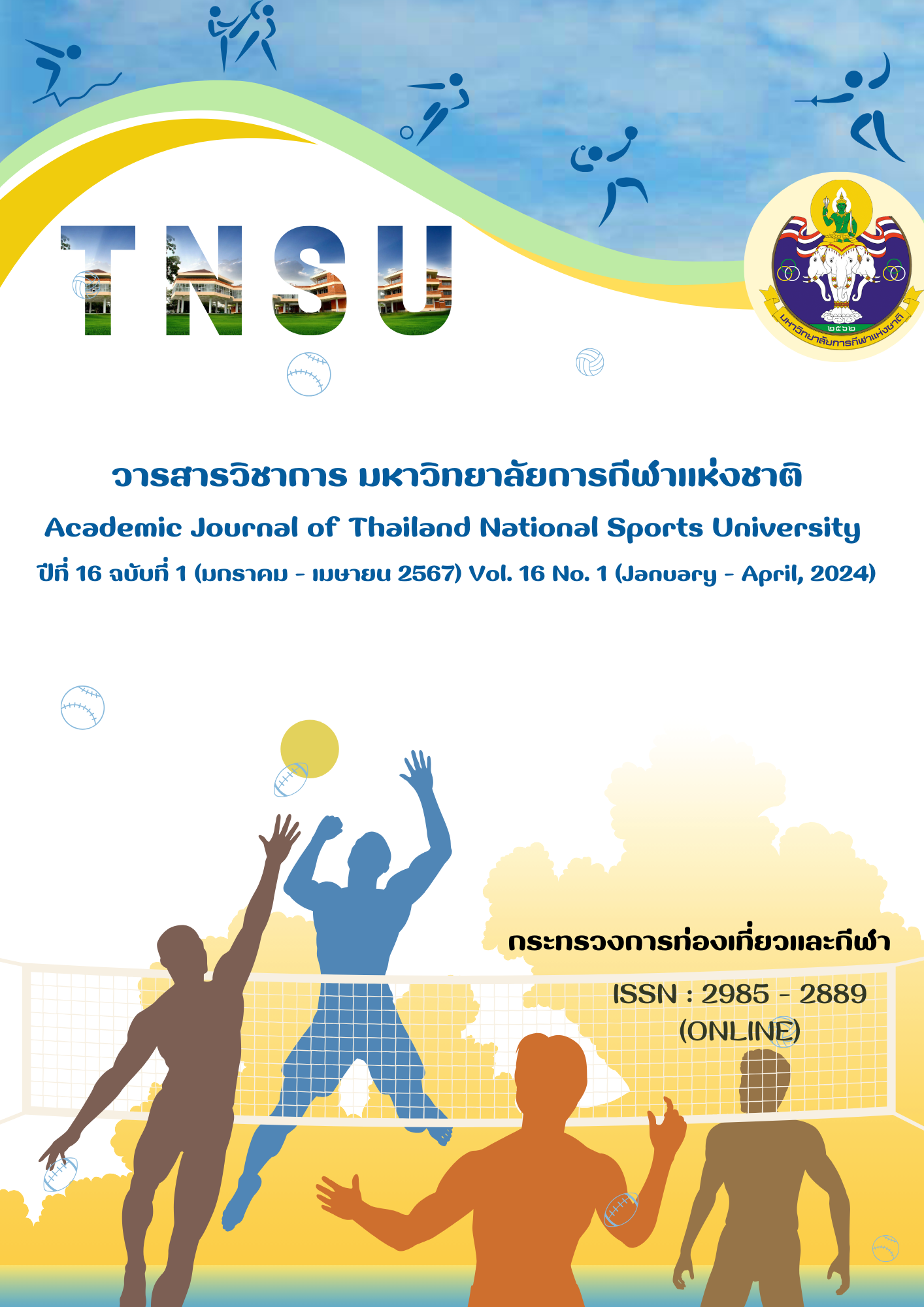MARKETING STRATEGIES FOR THE DEVELOPMENT OF RELATED PRODUCT AND SERVICE STANDARDS WITH SPORTS TOURISM
Main Article Content
Abstract
The objectives of this research were to 1) study the marketing and customer behavior; 2) identify the products and services related to sports tourism; 3) investigate the marketing strategies for the development of standard products and services related to sports tourism; and 4) propose the marketing plan for the development of standard products and services related to sports tourism. The purposive sampling and convenience sampling methods were adopted in this research. Descriptive statistics were used to analyze the data.
The results revealed that the marketing and customer behavior including travelling; environment; international tourism standards; and tourism places had influenced touristic behaviors of decision-making and repeat visitation. The results were found that products and services including varieties of tourism activities such as sports competition, sea travelling, and watching shows; convenience for purchasing tickets; tourism facilities; safety; and accommodation facilities were related to sports tourism. The results indicated that marketing strategies for the development of standard products and services including tourism experiences; prices; safety; and tourism marketing networks were related to sports tourism. The results also showed that the marketing plan for the development of standard products and services related to sports tourism was tourism publicity through mass media such as radio, television, and website. The recommendations of the research suggested that; 1) the development of tourism networks can promote the tourism growth; 2) the promotion of sports tourism should be based on the strengths of various tourism resources; and 3) tourism development should collaborate with three main actors including government, public sector, and private sector.
Article Details

This work is licensed under a Creative Commons Attribution-NonCommercial-NoDerivatives 4.0 International License.
The published article is a copyright of the Academic Journal of Thailand National Sports University. The passage appeared in each article in this academic journal is a perspective of each author which is not related to the journal. Each author is required to be responsible for all components of his/her own article. If there are any mistakes, each author must be responsible for those mistakes on his/her own.
References
Amarin Sukkasem. (2019). The development of sports tourism management guidelines for professional football clubs (Master’s thesis), University of Phayao.
Annaporn Suriyo. (2018). Market conditions of sports competition business in Chiang Mai Province. Academic Journal of Institutions of Physical Education, 10(3), 55 - 72.
Atlas, R., Nuraini Putit, P. A., Puem, L. B. G. & Enggong, T. S. (2018). Sports tourism: Factors. Retrieved from www.oic.go.th/FILEWEB/CABINFOCENTER3/DRAWER065/GENERAL/ DATA0000/00000150.PDF
Chanchanit Ketnoi, & Somruthai Sunthayathorn. (2018). The relationship between the 7P's marketing mix and the promotion of historic tourism Chan Palace Phitsanulok Province. Academic Journal of Institute of Physical Education, 10(2), 17 - 28.
Chaow Rojanasang. (2018). Teaching documents for the course series Communication and Marketing Promotion (4th ed.). Nonthaburi: Sukhothai Thammathirat University Press.
Department of Tourism. (2017). Research report on tourist attraction information in Thailand. Bangkok: Ministry of Tourism and Sports.
Hussain, S., Sahar K., Naeem A., Zafar - ul - Hye M., & Aon M. (2018). Combined zinc and nitrogen applications at panicle initiation for zinc biofortification in rice. Periodicum Biologorum, 120(2-3), 105 - 110.
Kanlaya Vanichbuncha. (2008). Using SPSS for Windows to analyze data (11th ed.). Bangkok: Dhammasarn.
Krishnat Santhavee, Chotiwat Watcharakiattisak, Natdanai Kuldumrong, Nattawat Trangjirasathien, & Panus Watcharaprapapong. (2016). Identity communication to promote eco - tourism. creativity of the Chiang Khong community. Khong Chi Mun Local Journal, 2(2), 71 - 108.
Ministry of Tourism and Sport. (2016). National Tourism Development Plan 2012 - 2016. Full report project to study guidelines for developing and promoting sports tourism. Bangkok: Ministry of Tourism and Sports.
Nattawut Maopraman, & Suwaree Namwong. (2017). Factors affecting the decision to join of in motorsport event: Competition entry of Bangsaen Thailand Speed Festival in Chonburi. Dusit Thani College Journal, 11(2), May – August. 186 - 201.
Prapassorn Meenoi, & Narin Sungraksa. (2019). Model and strategies for sports tourism management of the western region in the context of Thailand 4.0. Journal of Dusit Thani College, 13(2), 51 - 66.
Rasika Chanchotisathien (2018). Factors influencing the decision to participate in the run for life marathon event of the population in Muang District, Nakhon Ratchasima Province (Master’s thesis), Ramkhamhaeng University, Chaloem Phrakiat Academic Service Branch, Nakhon Ratchasima Province.
Rosmarin Arunothaiphiphat, & Pornthep Disayabutr. (2017). Touring cyclists’ preferences for bike friendly accommodation attributes. Veridian E - Journal, Silpakorn University, 10(2), May – August, 1476 - 1487.
Sajja Kraisonrat. (2017). Local community development to become a conservation tourism destination in terms of sports. A case study of Chom Bueng Community, Ratchaburi. Muban Chom Bueng Rajabhat University, Ratchaburi.
Wittaya Inpongphan (2018). Factors affecting sports tourism strategy of Thailand. Burapha Journal of Business Management, Burapha University, 8(1), January – June. 43 - 61.


